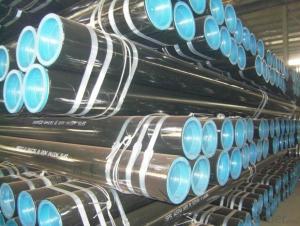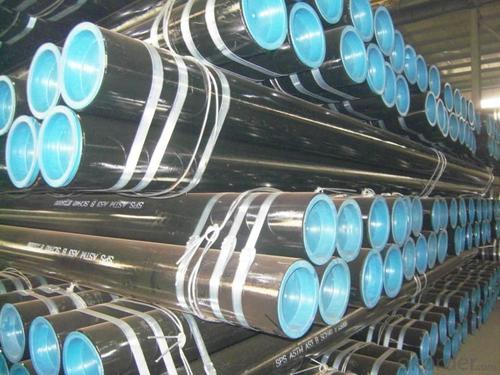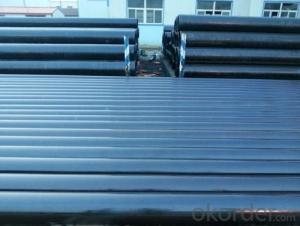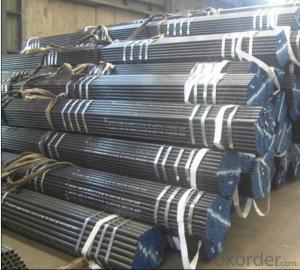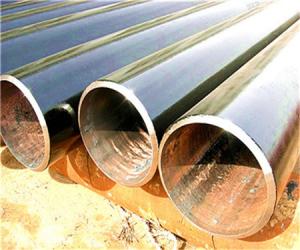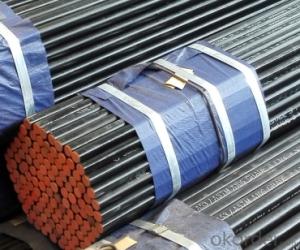Seamless Black Steel Pipe API PSL1/PSL2/X52/X70
- Loading Port:
- Tianjin
- Payment Terms:
- TT or LC
- Min Order Qty:
- 25 m.t.
- Supply Capability:
- 8000 m.t./month
OKorder Service Pledge
OKorder Financial Service
You Might Also Like
1、Structure of Seamless Black Steel Pipe API PSL1/PSL2/X52/X70:
Seamless pipe is formed by drawing a solid billet over a piercing rod to create the hollow shell. As the manufacturing process does not include any welding, seamless pipes are perceived to be stronger and more reliable. Historically seamless pipe was regarded as withstanding pressure better than other types, and was often more easily available than welded pipe.
2、Main Features of Seamless Black Steel Pipe API PSL1/PSL2/X52/X70:
• High manufacturing accuracy
• High strength
• Small inertia resistance
• Strong heat dissipation ability
• Good visual effect
• Reasonable price
3、Seamless Black Steel Pipe API PSL1/PSL2/X52/X70 Specification:
Standard | GB, DIN, ASTM ASTM A106-2006, ASTM A53-2007 |
Grade | 10#-45#, 16Mn 10#, 20#, 45#, 16Mn |
Thickness | 8 - 33 mm |
Section Shape | Round |
Outer Diameter | 133 - 219 mm |
Place of Origin | Shandong, China (Mainland) |
Secondary Or Not | Non-secondary |
Application | Hydraulic Pipe |
Technique | Cold Drawn |
Certification | API |
Surface Treatment | factory state or painted black |
Special Pipe | API Pipe |
Alloy Or Not | Non-alloy |
Length | 5-12M |
Outer Diameter | 21.3-610mm |
Grade | 20#, 45#, Q345, API J55, API K55, API L80, API N80, API P110, A53B |
Standard | ASME, ASTM |
1) Material:20#(ASTM A 106/A53 GRB.API5LGRB,GB),45#,16Mn,10#.
2) Specification range:OD:21.3-610mm,WT:6-70mm,length:6-12m or according to the requirement of clients.
3) Excutive standards:GB,ASME API5L.ASTM A 106/A53,Despite of the above standards,we can also supply seamless steel pipe with standard of DIN,JIS,and so on,and also develop new products according to the requirements of our clients!
4) Surface:black lacquered,varnish coating or galvanized.
5) Ends:Beveled or square cut,plastic capped,painted.
6) Packing:bundles wrapped with strong steel strip,seaworthy packing.
4、Packaging & Delivery
Packaging Details: | seaworthy package,bundles wrapped with strong steel strip |
Delivery Detail: | 15-30days after received 30%TT |
5、FAQ of Seamless Black Steel Pipe API PSL1/PSL2/X52/X70:
①How is the quality of your products?
Our products are manufactured strictly according to national and internaional standard, and we take a test
on every pipe before delivered out. If you want see our quality certifications and all kinds of testing report, please just ask us for it.
Guaranteed: If products’ quality don’t accord to discription as we give or the promise before you place order, we promise 100% refund.
②How about price?
Yes, we are factory and be able to give you lowest price below market one, and we have a policy that “ for saving time and absolutely honest business attitude, we quote as lowest as possible for any customer, and discount can be given according to quantity”,if you like bargain and factory price is not low enough as you think, just don’t waste your time.Please trust the quotation we would give you, it is professional one.
③Why should you chose us?
Chose happens because of quality, then price, We can give you both.Additionally, we can also offer professional products inquiry, products knowledge train(for agents), smooth goods delivery, exellent customer solution proposals.Our service formula: good quality+good price+good service=customer’s trust
SGS test is available, customer inspection before shipping is welcome, third party inspection is no problem.
6、Seamless Pipe ASTM A106/53 Images:
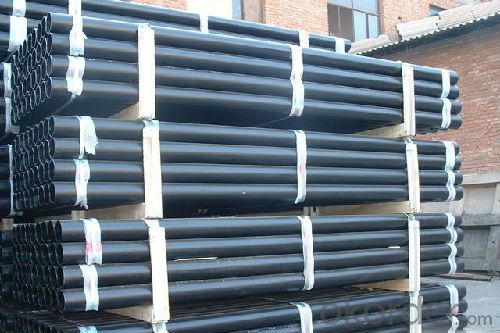
- Q: How are steel pipes used in the manufacturing sector?
- Steel pipes are used in the manufacturing sector for various purposes such as transporting fluids and gases, supplying water, and carrying out structural applications. They are commonly used in industries like oil and gas, construction, automotive, and aerospace for their durability, strength, and resistance to corrosion. Additionally, steel pipes are crucial in the manufacturing of machinery, equipment, and infrastructure, making them essential components in many manufacturing processes.
- Q: What are the different methods of coating steel pipes?
- There are several methods of coating steel pipes, including fusion bonded epoxy (FBE) coating, polyethylene (PE) coating, polyurethane (PU) coating, and cement mortar lining. These coatings are applied to protect the steel pipes from corrosion, increase their lifespan, and improve their performance in various applications.
- Q: What are the common sizes of steel pipes?
- The common sizes of steel pipes vary widely, but some common diameters range from 1/8 inch to 36 inches, with wall thicknesses typically ranging from Schedule 10 to Schedule 160.
- Q: How are steel pipes used in the construction of underground parking structures?
- Steel pipes are used in the construction of underground parking structures for various purposes, such as providing structural support, drainage, and ventilation. They are commonly used as piles or caissons to support the weight of the structure and prevent it from sinking into the ground. Additionally, steel pipes are utilized for the installation of drainage systems to prevent water accumulation and ensure the structural integrity of the parking structure. They are also employed for ventilation purposes, allowing fresh air to circulate and remove any potentially hazardous gases. Overall, steel pipes are essential components in the construction of underground parking structures, ensuring their stability, safety, and functionality.
- Q: How to make the magnetic steel, can be like a magnet?
- Magnetization. Winding the insulated wire on the object, passing in the direct current, and taking it down after a period of time.
- Q: What are the different types of couplings used with steel pipes?
- There are several types of couplings used with steel pipes, including threaded couplings, slip-on couplings, compression couplings, and grooved couplings.
- Q: How are steel pipes connected to other materials like concrete or plastic?
- Various methods are commonly employed to connect steel pipes to other materials such as concrete or plastic. Among these methods, fittings play a significant role. Fittings, specialized components, serve to facilitate the connection between different materials or sections of pipe. These fittings are available in a variety of shapes and sizes, including elbows, tees, reducers, and couplings, and are designed to establish a dependable and leak-proof connection. When it comes to connecting steel pipes to concrete, one method involves the utilization of concrete anchors. These anchors are embedded within the concrete structure and provide a stable foundation for securing the steel pipe. Clamps or brackets are subsequently employed to attach the pipe to the anchor. In the case of joining steel pipes to plastic materials, the use of transition fittings proves to be effective. These fittings are specifically crafted to connect steel pipes with plastic pipes. They typically feature different connection mechanisms on each end, such as threads or compression fittings, enabling a secure and reliable joint. Welding techniques can also be employed to connect steel pipes to other materials in certain situations. Welding involves melting the ends of the steel and the other material together to create a robust joint. This method is commonly utilized for connecting steel pipes to steel structures or components. In summary, the connection of steel pipes to materials like concrete or plastic necessitates the utilization of specialized fittings, anchors, or welding techniques. These methods guarantee a secure, long-lasting connection capable of withstanding the demands of the given application.
- Q: How are steel pipes protected against corrosion in marine environments?
- Steel pipes are protected against corrosion in marine environments through various methods, such as applying protective coatings, using sacrificial anodes, employing cathodic protection, and implementing corrosion inhibitors.
- Q: Can steel pipes be used for oil refineries?
- Yes, steel pipes can be used for oil refineries. Steel pipes are commonly used in oil refineries due to their durability, high strength, and resistance to corrosion, making them suitable for transporting crude oil and refined products under high pressure and harsh conditions.
- Q: What are the common grades of steel used in pipes?
- The common grades of steel used in pipes include ASTM A53, ASTM A106, and API 5L.
Send your message to us
Seamless Black Steel Pipe API PSL1/PSL2/X52/X70
- Loading Port:
- Tianjin
- Payment Terms:
- TT or LC
- Min Order Qty:
- 25 m.t.
- Supply Capability:
- 8000 m.t./month
OKorder Service Pledge
OKorder Financial Service
Similar products
Hot products
Hot Searches
Related keywords
